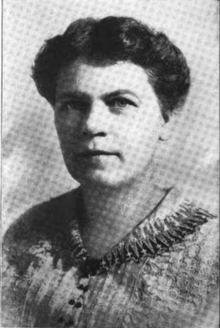Mary Dranga Campbell
Mary Dranga Campbell (1867 – August 8, 1957), born Mary Ogden Dranga, was an American social worker, active in work on blindness prevention and rehabilitation.
Early life and education
Mary Ogden Dranga was born in California, the daughter of Niels G. O. Dranga and Ingeborg Aarnas (Emily Ogden) Dranga. Her parents were Norwegian immigrants. She took library training courses at Stanford University from 1900 to 1903, earned a library certificate from the University of California, and took courses at the Chicago School of Civics and Philanthropy in 1909 and 1910.[1][2]
Her sister Wilhelmina Dranga Campbell (1871-1911) was an art educator who also worked on blind causes;[3][4] another sister, Amelia Dranga (1866-1933), was a medical doctor.[5] Their sister-in-law was artist Helen Thomas Dranga (1866-1927).
Career
Mary Dranga Campbell was the head cataloger at the Indiana University library for six years, from 1903 to 1909. She was Chicago field agent for the Eugenics Record Office, active in investigating the Ben-Ishmael Tribe.[2] After marriage, she worked on the publication the Outlook for the Blind, and as the assistant attendant of the Ohio School for the Blind.[6]
After World War I, Campbell spent three years in Serbia working with child welfare, going back to the United States to lecture on the social welfare issues that the Balkan states were facing.[7]
In 1926, Campbell returned to her earlier work as executive director of the Council of the Blind in Pennsylvania.[2] She became the executive secretary of the Missouri Commission of the Blind in 1929.[8][9][10] In 1932, she was named the director of work for people with disabilities in the Brooklyn Bureau of Charities. She resigned in 1934 to become the head of the social service division of The Seeing Eye. Her work with The Seeing Eye lasted for 11 years until she retired at almost 70 years old.[7]
Publications by Campbell included "Help for the Newly Blinded" (1942, American Journal of Nursing).[11]
Awards
Campbell received the Ambrose M. Shotwell Award from the American Association of Workers for the Blind in 1950,[12] the Migel Medal from the American Foundation for the Blind in 1955,[1] and was the Delta Zeta sorority's 1956 Woman of the Year.[13]
Personal life
In 1912, Mary Dranga married her sister's widower, Charles Francis Faulkner Campbell (1876-1935), the son of blind educator Sir Francis Joseph Campbell.[14] She became a stepmother to her sister's three young children with Campbell. The couple separated in 1918.[15] She died in 1957, aged 90 years, while living with a niece in Reedsville, Pennsylvania.[1]
References
- ^ a b c "MARY CAMPBELL, AIDE OF BLIND, 81; Ex-Archivist for American Foundation Dead--Active in Units in Many States". The New York Times. 1957-08-09. ISSN 0362-4331. Retrieved 2020-07-31.
- ^ a b c Latimer, H. Randolph (March 1926). "Executive Director of a Newly Created Council for the Blind in Pennsylvania". Outlook for the Blind. 19: 12–14.
- ^ "Mrs. C. F. F. Campbell". The Pittsburgh Press. 1911-11-21. p. 9. Retrieved 2020-07-31 – via Newspapers.com.
- ^ Wilhelmina Dranga Campbell, 1871-1911 :a memorial. Columbus, Ohio. 1912. hdl:2027/inu.30000092279060.
- ^ "Rites Tonight for Dr. Dranga". Pittsburgh Post-Gazette. 1933-05-29. p. 7. Retrieved 2020-07-31 – via Newspapers.com.
- ^ "Masthead". The New Outlook for the Blind. 10: xxviii. January 1917.
- ^ a b A. Koestler, Frances (2004). The Unseen Minority: A Social History of Blindness in the United States. American Foundation for the Blind. p. 551. ISBN 9780891288961.
- ^ Campbell, Mary Dranga (March 1930). "New Executive Director". Journal of Visual Impairment & Blindness. 23 (4): 31. doi:10.1177/0145482x3002300416. ISSN 0145-482X. S2CID 220537779.
- ^ "St. Louis Jewish Women to Observe Day for the Blind". Jewish Telegraphic Agency. 1930-03-10. Retrieved 2020-07-31.
- ^ "Interested in Blind". St. Joseph News-Press. 1931-09-15. p. 6. Retrieved 2020-07-31 – via Newspapers.com.
- ^ Campbell, Mary Dranga (November 1942). "Help for the Newly Blinded". The American Journal of Nursing. 42 (11): 1284–1287. ISSN 0002-936X. PMID 20253098.
- ^ "Previous AER Award Winners". Association for Education and Rehabilitation of the Blind and Visually Impaired. Retrieved August 9, 2017.
- ^ "Mary Dranga Campbell". Delta Zeta Museum. Retrieved August 9, 2017.
- ^ Sir Francis Joseph Campbell papers. Retrieved 2020-07-31.
{{cite book}}:|website=ignored (help) - ^ "Copies of Mary Ogden Dranga photograph album of Hopi pueblos · SOVA". Smithsonian Online Virtual Archives. Retrieved 2020-07-31.

